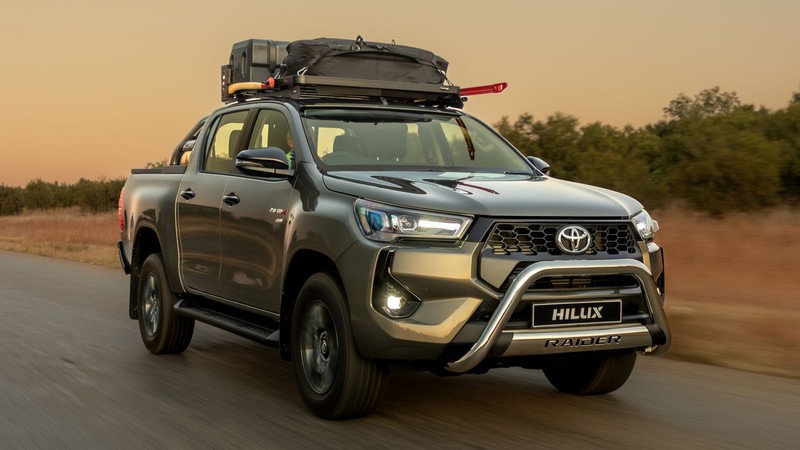
DRIVEN: NEW TOYOTA HILUX RAIDER 48V IMPRESSES WITH ITS SMOOTH PERFORMANCE
Hybrid cars are nothing new for Toyota, in fact the first Prius was launched in 1997 and while it was castigated for its looks, it laid the foundation for what was then considered groundbreaking, before the world was going gaga and forcing electric cars onto us.
It’s also no secret that the Japanese car maker has been accused of not doing enough when it comes to battery electric vehicles (BEVs) from some sectors, but in true Toyota fashion they are keeping their powder dry and doing a multi-pathway approach rather than throwing the baby out with the bathwater.
Apart from traditional ICE and diesel engines they are doing important work and research to make sure that the best possible solution for a given application is found.
Rather than a one battery solution to fit all, they are doing intense research into BEVs, various hybrid models, biofuel and hydrogen.
All of which brings us to their latest hybrid offering in the form of the ever-popular and best selling Hilux bakkie in 48V mild hybrid format also available in the Fortuner SUV.
Unlike the Prius (which is no longer with us) and the current Corolla and Corolla Cross hybrid this 48V is a mild application with the diesel engine only aided by the battery rather than offering various electric driving modes.
Still, Toyota claims a consumption improvement of between 7-11 percent, although this has yet to be verified in real-world testing.
It’s connected to the same GD-6 four cylinder turbo-diesel engine with 150kW and 500Nm and six-speed automatic gearbox providing an additional 12kW and 65Nm.
Fitted with stop-start the 48V system allows the engine to be switched off longer and also reduces the idling speed from 720rpm to 600rpm.
The motor generator unit has been installed high in the engine bay to retain the 700mm wading depth with a redesigned ribbed fabric generator belt to prevent it slipping when wet and the 7.6kg 48V lithium battery is tucked away under the rear seats.
Like all hybrids the battery is regenerated (very quickly) by harvesting the kinetic energy under braking and deceleration.
Both the 48V Hilux and Fortuner are fitted with a multi-select (MTS) mode that provides torque and traction configurations for specific surfaces.
Improved driveability
I doubt that the 48V Hilux is quicker than the normal garden variety but where the mild hybrid system does make a difference is on pull away and passing.
On our KZN launch route in the Valley of a Thousand Hills (dubbed a thousand potholes) we gave it a thorough testing in Sport Mode using the battery to pull away seamlessly until the engine kicks in with the turbo already spooled up. It’s the same with passing slower traffic like heavily laden sugar cane trucks, briefly giving the bakkie a bit of a shunt.
The seamless transition from the stop-start system on pull away also impressed us.
Beyond that, the driving dynamics and handling is still very much as you would expect from current ladder-frame Hilux double cab.
Toyota also used the occasion to introduce a couple of aesthetic changes to the Raider range.
It gets a new front-end refresh with a redesigned front bumper, honeycomb mesh grille, and newly designed fog lamp bezels.
There’s black side mirrors and door handles (on the 2.8 models), and rear bumper and tailgate handle replacing the chrome accents.The 2.4 model gains retractable mirrors, while the 2.8 gains leather seats and eight-way power seat adjustment on the driver’s side.
In addition the Raider 48V adds jam protection, auto up/down windows on all windows, push start, smart entry, and Multi-Terrain Select.
One-stop shop for accessories
There’s good news for those looking to accessorise and customise their bakkies with non-safety critical additions such as roof racks, cross bars, rooftop tents, roof boxes, bike carriers, fridges, recovery boards and solar panels.
Toyota South Africa has collaborated with Ironman 4x4, 4x4 Megaworld, Front Runner, IVXIVBUSHINDABA, and Thule to provide a one-stop shop that can be added prior to taking delivery and can be part of the vehicle finance options or invoiced separately.
It’s available across the full range of lifestyle vehicles including Hilux, Fortuner, Land Cruiser Prado, Land Cruiser 70 Series and Land Cruiser 300.
It will be interesting to see how South Africans take up the Toyota Hilux 48V Raider with a price premium of R15,500 for the 4X2 and R18 000 for the 4x4.
My guess is that this is more part of Toyota’s global strategy rather than Toyota SA looking to sell them in large numbers.
It comes with a nine-services/90,000km service plan and a three-year/100,000km warranty. Customers can additionally purchase service/maintenance/warranty extensions via the Toyota dealer network.
Toyota Hilux Raider Range Pricing (July 2024)
Extra Cab
- Raider 2.8 GD-6 RB 6AT: R587 200
- Raider 2.8 GD-6 4X4 6MT: R563 200
Double Cab
- Raider 2.8 GD-6 4×4 6MT: R612 100
- Raider 2.8 GD-6 RB 6AT: R633 200
- Raider 2.4 GD-6 4×4 6AT: R716 300
- Raider 2.8 GD-6 RB 6AT: R769 900
- Raider 2.8 GD-6 RB 6AT 48V: R785 400
- Raider 2.8 GD-6 4×4 6AT: R858 600
- Raider 2.8 GD-6 4×4 6AT 48V: R876 600